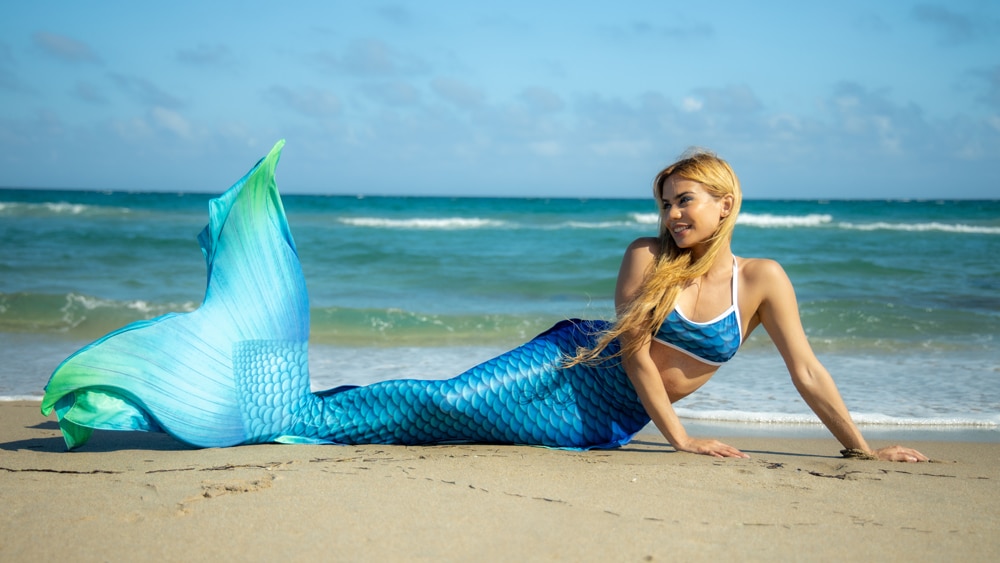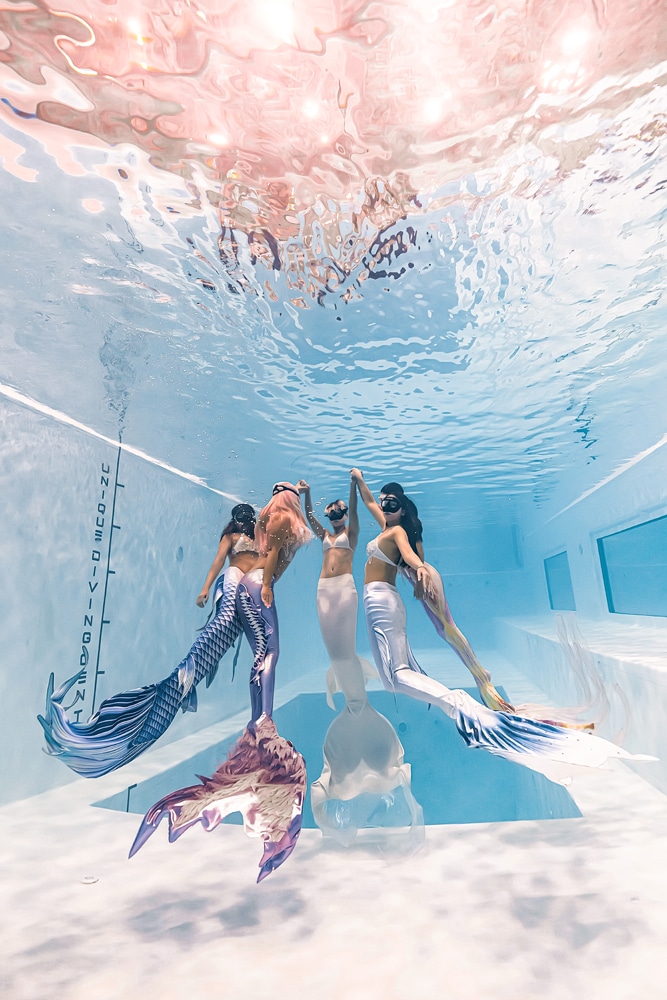Dive Training Blogs
Dive in and discover your inner mermaid with PADI this summer

Some superheroes wear capes, others wear mermaid tails. Leading diver training agency PADI has introduced a range of PADI Mermaid Courses designed to provide water-enthusiasts with an additional outlet for exploring the underwater world.
Mermaiding is a growing trend across the globe and with World Mermaid Day taking place today, March 29th, PADI’s new courses will enable people to learn new skills, explore the underwater world and in turn – protect our blue planet.
Scuba diving is an incredible means to do that, but other water sports such as freediving and mermaiding, enable a similar experience. You will learn to master the art of breath holding and how to swim with a tail, then move on to improve your comfort in the water, learn how to read ocean conditions, navigate currents and interact with marine life.
No previous dive experience is required and anyone over the age of 6 can become a PADI Mermaid or Merman with the new PADI Mermaid Course.
As summer approaches, it’s the perfect time to dive in and experience new family underwater adventures on holiday while learning new skills and making your mermaiding dreams come true at PADI Dive Centres around the globe, including off our shores in the UK.
Courses vary between 1 and 3 days and include:
- PADI Discover Mermaid experience:
- no prerequisites
- completed in 2-4 hours
- Test out what it is like to be a PADI Mermaid and splash a tail, with a PADI Mermaid Pro helping you every step of the way
- Costs start at £85
- PADI Mermaid Course:
- Be able to swim 50m, float for 5 min and recommended age of 10
- Completed in 1 day, includes eLearning and in-water training
- Learn about mermaid culture, how to swim with a tail, breath holding techniques and how to channel your inner mermaid
- Costs start at £250
- PADI Advanced Mermaid Course:
- Must first complete PADI Mermaid course or an equivalent from another training organisation
- Completed in 2 days, includes eLearning and in-water training
- Improve your comfort in the water, learn how to read ocean conditions, navigate currents and interact with marine life, train in rescues and assists, enhance your breath holding techniques and learn how to pose for your ultimate mermaid photos beneath the surface (*photo sessions dependent on individual provider)
- Costs start from £350
With PADI Professionals and Dive Centres teaching the world how to mermaid, you can safely and quickly learn the art of breath holding and the mermaid tail in the tropical atolls of the Maldives, in the glacier lakes of Switzerland, in farmland Wisconsin, along picturesque beaches in Australia or in Cornwall – the mermaid capital of the world.
You can take an incredible holiday anywhere in the world where there’s an official PADI Mermaid Centre and return an official PADI Mermaid, with a certificate – all in the safe hands of a PADI Mermaid Pro helping you every step of the way.
Learn more here about how to become a PADI Mermaid.
Blogs
PADI Recognises EMEA Members with New Professional Development Excellence Award

PADI® (Professional Association of Diving Instructors®) has recently launched their new Professional Development Excellence Award in EMEA (Europe, Middle East and Africa), celebrating PADI Five Star Instructor Development Centers (IDC) that are championing creating more PADI Professionals, at all levels, during the previous calendar year.
“While becoming a PADI Five Star IDC Center is a prized accreditation amongst members, this exclusive rating comes with the responsibility of training the next generation of divers to become PADI Instructors,” explains Dave Murray, Managing Director for PADI EMEA.
“PADI’s commitment to a continuing education philosophy encourages divers to realise their dreams of a career as a PADI Pro, teaching others to do what they love – to scuba dive. This new recognition award distinguishes productive PADI Five Star IDC stores for the time and effort they dedicate to marketing and conducting the professional training needed to grow the scuba diving industry.”
PADI’s EMEA Professional Development Excellence Award recognises members for reaching specific milestones based on the number of PADI Pro certifications they issue annually. It also provides an extra layer of credentials in their “Pro Development Status” to potential Divemaster and IDC candidates, along with any other prospective Pro-level customers and prospective employees.
The first awards were distributed earlier this year, with 12 PADI Five Star IDC Centers receiving the Platinum Award. This means that they have issued a minimum of 100 PADI Professional certifications from Divemaster to IDC Staff Instructor, which include 30 Core Professional certifications and 70 Continuing Education Instructor level certifications.

The 2025 PADI EMEA Professional Development Excellence Award is already underway and renewed PADI EMEA Five Star IDC Dive Centers and Resorts are automatically eligible. Stores that reach the recognition levels during 2024 will receive their award in the first quarter of 2025.
For more information about the award and to see the full list of award recipients visit here.
About PADI
PADI® (Professional Association of Diving Instructors®) is the largest purpose-driven diving organization with a global network of 6,600 dive centers and resorts, 128,000 professional members, and more than 30 million certified divers to date. Committed to our blue planet, PADI makes the wonder of the underwater world accessible to all, empowering people around the world to experience, explore and take meaningful action, as Ocean TorchbearersTM, to protect the world beneath the surface. For over 50 years, PADI is undeniably The Way the World Learns to Dive®, setting the standard for the highest quality dive training, underwater safety and conservation initiatives while evolving the sport of diving into a passionate lifestyle. For divers by divers, PADI is obsessed with transforming lives and, with its global foundation, PADI AWARETM, creating positive ocean change. Seek Adventure. Save the Ocean.SM www.padi.com
Blogs
Two great programs to thrill and excite from RAID

RAID’s Performance Diver program is part of the training agency’s unique ‘tune-up’ options for divers at all levels, from basic to technical. Its appeal to newer divers who did not get all they wanted from their open water course (perhaps with a non-RAID dive centre) has always been strong. But it’s a winning option for someone who has been inactive for a while as well.
The skills taught in this course have been designed by some of the most respected dive professionals in the industry. They have condensed years of in-water experience into a great program that’s fuelled by great ideas and solid knowledge. Something useful in all sorts of conditions and all sorts of gear configurations. In short, a range of skills you will use on every dive: buoyancy, trim, situational awareness, gear selection and management, contingency planning… having fun and staying safe.
You can find out more about RAID’s Performance Diver program here.
And with the agency’s renewed focus in 2024 on breath-hold programs, July is a good time to read about the benefits of RAID’s range of Freediving courses.
Freediving is such an exhilarating and beautiful sport that allows you to connect with the underwater world in a unique way.
The thrill of diving deep down, holding your breath, and exploring the depths with just a single breath is truly an unforgettable experience.
It requires focus, control, and a deep respect for the ocean. The sense of freedom and tranquility you can find while freediving is unlike any other.
Have you ever tried freediving or are you interested in learning more about it? You do not have to be a scuba diver to start… not at all!
And if you are already a diver, RAID can help you discover a whole new way to look at a familiar world.
You can find out more about RAID’s Freediving courses here.
To find out more about RAID and the agency’s diver training programs, visit diveraid.com.
-

 Blogs2 months ago
Blogs2 months agoDiving With… Nico, Ocean Earth Travels, Indonesia
-

 News1 month ago
News1 month agoMurex Bangka Announce New Oceanfront Cottages & Beachfront Dining
-

 Blogs2 months ago
Blogs2 months agoA new idea in freediving from RAID
-

 Marine Life & Conservation1 month ago
Marine Life & Conservation1 month agoIceland issue millionaire whale hunter a licence to murder 128 vulnerable fin whales
-

 Marine Life & Conservation2 months ago
Marine Life & Conservation2 months agoThe Shark Trust Great Shark Snapshot is back
-

 News3 months ago
News3 months agoCharting New Waters; NovoScuba Goes Global with the Launch of their Revolutionary Dive Training Agency!
-

 Gear News1 month ago
Gear News1 month agoNew Suunto Ocean – a dive computer and GPS sports watch in one for adventures below and above the surface
-

 Marine Life & Conservation Blogs2 months ago
Marine Life & Conservation Blogs2 months agoBook Review: Plankton
















